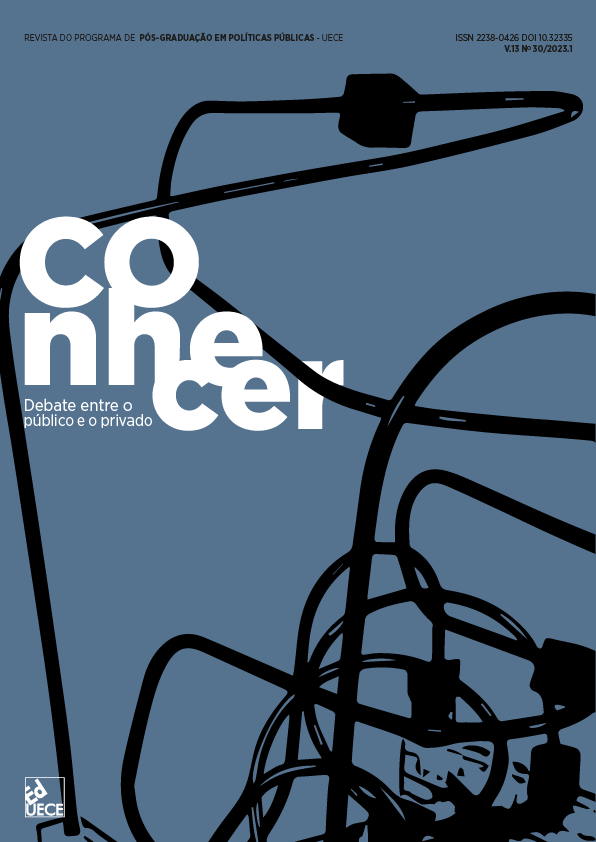Attention deficit hyperactivity disorder and academic performance:
systematic review
DOI:
https://doi.org/10.32335/2238-0426.2023.13.30.9692Keywords:
attention deficit hyperactivity disorder, child, academic achievement, health policyAbstract
Attention deficit hyperactivity disorder (ADHD) is usually diagnosed in school-age children. Thus, we have aimed to describe, through the literature, interventions for children with ADHD focusing on academic performance. This is a systematic review conducted in the databases BVS, SciELO, PubMed, LILACS, Periódicos CAPES, and IndexPsi, within the period from August 2018 to August 2019. This starting question has been adopted: do children with ADHD using pharmacological treatment show improvement in school performance when compared to another type of intervention? The eligibility criteria for the articles have been: publication between 2009 and 2019; at least one of the descriptors adopted in this study included in the title and abstract; and analysis of school performance. Eight studies have been selected; 1,132 children participated in them, from countries such as the United States of America (USA), China, and Norway. The most frequent intervention to treat ADHD for school/academic performance outcomes was pharmacotherapeutic, through the use of Methylphenidate. It was found that there are no studies focusing on multimodal treatment, thus, it is recommended to carry out research that addresses its effectiveness.
Downloads
References
Agência Nacional de Vigilância Sanitária. (2014). Metilfenidato no tratamento de crianças com transtorno de déficit de atenção e hiperatividade. Boletim Brasileiro de Avaliação de Tecnologias em Saúde, 8(23), 1-18.
American Psychological Association. (1994). Diagnostic and statistical manual of mental disorders: DSM-IV (4th ed.). APA.
American Psychological Association. (2013). Diagnostic and statistical manual of mental disorders: DSM-5 (5th ed.). APA.
American Psychological Association. (2014). Manual diagnóstico e estatístico de transtornos mentais: DSM-5 (5a ed.). Artmed.
Azevedo, L. J. C. (2018). Medicalization of childhood: between care and medication. Psicologia USP, 29(3), 451-458.
Ciesielski, H. A., Tamm, L., Vaughn, A. J., Cyran, J. E. M., & Epstein, J. N. (2019). Academic skills groups for middle school children with ADHD in the outpatient mental health setting: an open trial. Journal of Attention Disorders, 23(4), 409-417.
Domitrovic, N., & Caliman, L. V. (2017). As controvérsias sócio-históricas das práticas farmacológicas com o metilfenidato. Psicologia & Sociedade, 29, e163163.
DuPaul, J. G., & Stoner, G. (2007). TDAH nas escolas: estratégias de avaliação e intervenção. M. Books.
Egeland, J., Aarlien, A. K., & Saunes, B. K. (2013). Few effects of far transfer of working memory training in ADHD: a randomized controlled trial. PloS One, 8(10), 1-9.
França, M. T. B. (2012). Transtorno de déficit de atenção e hiperatividade (TDAH): ampliando o entendimento. Jornal de Psicanálise, 45(82), 191-207.
Froehlich, T. E., Antonini, T. N., Brinkman, W. B., Langberg, J. M., Simon, J. O., Adams, R., Fredstrom, B., Narad, M. E., Kingery, K. M., Altaye, M., Matheson, H., Tamm, L., & Epstein, J. N. (2014). Mediators of methylphenidate effects on math performance in children with attention-deficit hyperactivity disorder. Journal of Developmental and Behavioral Pediatrics, 35(2), 100-107.
Galvão, T. F., Pansani, T. S. A., & Harrad, D. (2015). Principais itens para relatar revisões sistemáticas e meta-análises: a recomendação PRISMA. Epidemiologia e Serviços de Saúde, 24(2), 335-342.
Hora, A. F., Silva, S. S. C., Ramos, M. F. H., Pontes, F. A. R., & Nobre, J. P. S. (2015). A prevalência do transtorno do déficit de atenção e hiperatividade (TDAH): uma revisão de literatura. Psicologia, 29(2), 47-62.
Merrill, B. M., Morrow, A. S., Altszuler, A. R., Macphee, F. L., Gnagy, E. M., Greiner, A. R., Coles, E. K., Raiker, J. S., Coxe, S., & Pelham, W. E. (2017). Improving homework performance among children with ADHD: a randomized clinical trial. Journal of Consulting and Clinical Psychology, 85(2), 111-122.
Muris, P., Roodenrijs, D., Kelgtermans, L., Sliwinski, S., Berlage, U., Baillieux, H., Deckers, A., Gunther, M., Paanakker, B., & Holterman, I. (2018). No medication for my child! A naturalistic study on the treatment preferences for and effects of Cogmed working memory training versus psychostimulant medication in clinically referred youth with ADHD. Child Psychiatry & Human Development, 49, 974-992.
Saiz Fernández, L. C. (2018). Psicoestimulantes para el TDAH: análisis integral para una medicina basada en la prudencia. Revista de la Asociación Española de Neuropsiquiatría, 38(133), 301-330.
Santos, C. M. C., Pimenta, C. A. M., & Nobre, M. R. C. (2007). The PICO strategy for the research question construction and evidence search. Revista Latino-Americana de Enfermagem, 15(3), 508-511.
Schmitt, J. C., & Justi, F. R. R. (2021). A influência de variáveis cognitivas e do TDAH na leitura de crianças. Psicologia: Teoria e Pesquisa, 37, e37326.
Siqueira, C. M., & Gurgel-Giannetti, J. (2011). Mau desempenho escolar: uma visão atual. Revista da Associação Médica Brasileira, 57(1), 78-87.
Sousa, M. C., & Fontoura, H. S. (2017, outubro). Aspectos biopsicossociais de portadores de TDAH: revisão de literatura. (Painel). In Anais do 4o Congresso de Ensino, Pesquisa e Extensão da Universidade Estadual de Goiás. Goiânia, GO.
Stein, M. A., Sikirica, V., Weiss, M. D., Robertson, B., Lyne, A., & Newcorn, J. H. (2015). Does Guanfacine extended release impact functional impairment in children with attention-deficit/hyperactivity disorder? Results from a randomized controlled trial. CNS Drugs, 29(11), 953-962.
Wietecha, L., Williams, D., Shaywitz, S., Shaywitz, B., Hooper, S. R., Wigal, S. B., Dunn, D., & McBurnett, K. (2013). Atomoxetine improved attention in children and adolescents with attention-deficit/hyperactivity disorder and dyslexia in a 16 week, acute, randomized, double-blind trial. Journal of Child and Adolescent Psychopharmacology, 23(9), 605-613.
Wigal, S. B., Wigal, T., Schuck, S., Brams, M., Williamson, D., Armstrong, R. B., & Starr, H. L. (2011). Academic, behavioral, and cognitive effects of OROS® methylphenidate on older children with attention-deficit/hyperactivity disorder. Journal of Child and Adolescent Psychopharmacology, 21(2), 121-131.
Zheng, Y., Liang, J. M., Gao, H. Y., Yang, Z. W., Jia, F. J., Liang, Y. Z., Fang, F., Li, R., Xie, S. N., & Zhuo, J. M. (2015). An open-label, self-control, prospective study on cognitive function, academic performance, and tolerability of osmotic-release oral system methylphenidate in children with attention-deficit hyperactivity disorder. Chinese Medical Journal, 128(22), 2988-2997.
Downloads
Published
How to Cite
Issue
Section
License
Copyright (c) 2023 Conhecer: debate entre o público e o privado

This work is licensed under a Creative Commons Attribution 4.0 International License.
Authors who publish in this journal agree with the following terms:
- Authors retain the copyright and grant the journal the right of first publication, and the study is simultaneously licensed under the Creative Commons Attribution License, which allows sharing the study by acknowledging authorship and initial publication in this journal.



